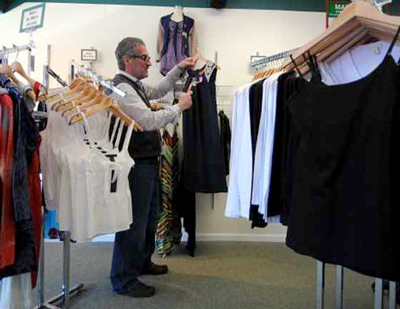 Second Time Around Founded in 1973 and based in Boston, the company has 25 stores, mostly on the East Coast. It does not release annual sales. It is opening its first New Jersey location in Englewood on Saturday.
Second Time Around Founded in 1973 and based in Boston, the company has 25 stores, mostly on the East Coast. It does not release annual sales. It is opening its first New Jersey location in Englewood on Saturday.
A Boston-based chain of consignment clothing stores is establishing a foothold in New Jersey this week, opening its first shop in Englewood on Saturday. The company, Second Time Around, also is scouting locations in Ridgewood, Hoboken and other New Jersey downtowns.
"I am very bullish on the whole Northeast,'' said Bill Soncini, chief executive officer of Second Time Around, in an interview in the Englewood store before leaving to check out locations in Hoboken and Westfield. "We do very well in New York, and I think we should probably do just as well in New Jersey."
Second Time Around primarily sells clothes on consignment, and operates like most consignment shops. People bring their gently used designer and name-brand clothes to the store to be sold. If a dress, top or pair of pants sells, the store keeps 60 percent of the sale price and the consigner, or previous owner of the clothes, keeps 40 percent. If an item is not sold or taken back by the end of 90 days, it becomes the property of the store.
Soncini said he chose Palisade Avenue in Englewood as the location for the chain's 25th store because "it's a hometown city, and they've got great demographics. They've also got a sophisticated taste level." While some Second Time Around stores carry men's clothing, the Englewood store will only sell women's apparel.
Soncini said the chain expects to open three to five more stores this year, and he plans to expand the chain to 100 stores within several years.
Second Time Around is one of three consignment chains with national ambitions, fueled by strong sales growth in recent years. The popularity of consignment stores surged during the recession and is expected to continue to grow as frugality remains fashionable in the face of rising gasoline prices and as unemployment in New Jersey is at 9.3 percent.
The consumer research firm America's Research Group found that as many as 15 percent of Americans surveyed last year said they shopped at consignment stores, and company Chairman C. Britt Beemer said he believes that percentage has grown. "It could be as high as 20 percent now," Beemer said. "I think that's going to continue to go up" as women look for ways to save money.
According to the Association of Resale Professionals, an industry trade group known as NARTS, the number of resale, consignment and thrift stores in the United States is growing at a rate of about 7 percent a year. The association estimates there are 25,000 to 30,000 resale, consignment and thrift stores around the country. That number includes non-profit organizations such as Goodwill.
Soncini, who spent time in Hawthorne from 2004 and 2007 as an executive vice president at The Rag Shops Inc., has worked for a number of retail chains, including Victoria's Secret and FAO Schwarz, and most recently at the swimwear chain Everything But Water.
He said he decided to join Second Time Around nine months ago because "I really believed that this business was prime" for growth. "The model works," Soncini said. "We differentiate ourselves in a couple of different ways. We have a very unique product that's constantly changing."
The stores also reflect the culture and fashion sense of the neighborhoods where they are located, because local shoppers bring in their castoffs for resale, he said.
Second Time Around also has an online tracking system for consignment items that gives it an edge over some independent stores. Consigners can see via computer if one of their items has sold, and for what price.
Adele Meyer, executive director of NARTS, said most resale and consignment stores are independently owned. "There are not a lot of chains, except for the non-profits, Goodwill, Salvation Army, Volunteers of America, things like that," she said.
Chains such as Second Time Around and Crossroads, she said, usually face the same challenge as an independent when they move into a new area of building name recognition among consumers. "These aren't stores like Walmart that run commercials on a daily basis," she said.
Englewood already has one other upscale women's consignment store, Double Take, which opened in October, and a men's consignment shop, Gentlemen's Agreement. Meyer said consignment shops, like antique stores, benefit from "clustering" - when several similar stores open near each other. Clustering, she said, makes a downtown more of a draw for consignment store fans, if they can visit several stores in one trip.